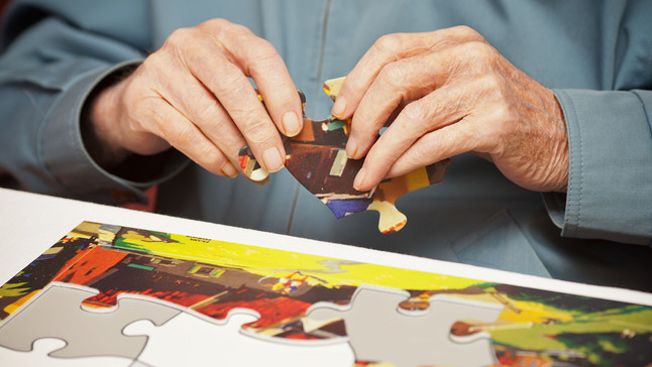Designing activities for people with dementia and their families

It’s hard to watch family members lose the ability to create and play as dementia takes hold. And it makes finding enjoyable activities to share harder too. One young designer, Ben Atkinson-Willes, has worked with experts to develop activities that are satisfying, doable and promote conversation.
Dementia affects not only the patient but those responsible for their care, such as family members, with many carers finding the process challenging and lonely.
Research into dementia shows that there is a marked benefit in keeping someone living with dementia occupied and stimulated as the disease progresses.
It has also been demonstrated that cognitive stimulation is the best tool for reducing a number of symptoms that can be shown by a dementia patient, such as restlessness, aggressive behaviour and sleeplessness.
Finding feasible and enjoyable activities
When my Grandfather was diagnosed with Alzheimer’s in 2009 I started research into how I could better the lives of people living with mental illnesses.
I had noticed that as the illness progressed my Grandfather’s ability to play games was affected. Due to the lack of products that were available for people living with these illnesses it meant that his carers found it hard to find stimulating activities for him. It meant they had to resort to giving him children’s toys that were not only patronising but also inappropriate for the needs of someone living with dementia.
It was this that brought me to the realisation that something had to be done and so I decided to utilise the skills I had learned, as at the time I was a design student at Kingston University. I began consultation with carers in a local home as well as the head of dementia care at St George’s hospital. From there I began developing activity products specifically designed for people living with dementia.
Each of these products was created to help the patient with specific aspects of their dementia, whilst also enabling patients and their families/carer to communicate and interact in a positive way.
Redefining jigsaw puzzles
Research has shown that people with mid to late stage dementia find it difficult to match the pieces to the picture on the box using a conventional jigsaw.
To combat this we looked at designing jigsaws on a coloured background with outlines of the pieces added. This means that people working on them can match the piece to the background making the product more intuitive and enabling them to complete the jigsaw unassisted.
Dexterity and cognitive and visual impairment challenges are also important. Images with a high colour contrast help people who have visual issues and the pieces are large and tactile enough to be used by elderly hands unaided.
The choice of image is important too. A good jigsaw is age appropriate and stimulates memories and conversation once the puzzle is complete.
These award-winning puzzles encourage bonding as the family interact with each other during and on completion. They enable the person with dementia to communicate and interact with family members on their terms, reminiscing about any memories the jigsaw image conjures up. In turn, families can encourage this conversation by asking questions.
A new way of painting
For many people living with dementia, hobbies such as painting that they used to relish can become too difficult as not only cognitive but also mobility issues develop. This can leave then feeling disheartened and frustrated.
We developed a different way of painting to combat this and help promote independence whilst instilling a sense of pride and satisfaction when traditional painting activities become too difficult.
Aquapaint is a reusable water painting product designed as a creative, mess-free, therapeutic art activity for people with mid to late stage dementia. It consists of five seemingly blank canvases that turn into attractive images as the user brushes water over them. The image can then help to spark conversations and enable the painter to feel more connected.
Once painted, the canvases can be left to dry until the image fades and the canvas returns to white, ready to be used time and again.
Reminiscence activities
Often people with dementia are able to recall the past easily but struggle to remember recent events. Therefore, an activity that involves reminiscing is a good way to help encourage self-esteem and inclusion, combat depression and feelings of isolation and help carers and family members feel connected to their loved ones.
Active Minds offers a specific range of reminiscence activities that will help encourage discussions about the past. These include pictures books about childhood days and memory bank DVDs with archived footage on topics such as working life.
It’s all intended to evoke memories about the past reflecting on and sharing stories from the past can help to affirm the essence of identity which is incredibly important for a person living with dementia.
Keeping people with dementia mentally and physically stimulated has a huge impact on their health and quality of life. At Active Minds we have a passionate about developing achievable and age-appropriate activity resources that enable people with all stages of dementia to continue leading active and fulfilling lives.
You can find out more about Active Minds and the products the team has developed to assist people with dementia enjoy activities that are meaningful to them and their families by visiting the Active Minds website.
Read more about activities for those with dementia and their families in some of our other expert articles:
Dementia, creativity and napkins. Yes, napkins!
Dad, dementia, and connecting through art
Helping people with dementia to enjoy the outdoors
If you’re not yet one of our family, why not sign up for free newsletters and guides? Just click on the button below.

